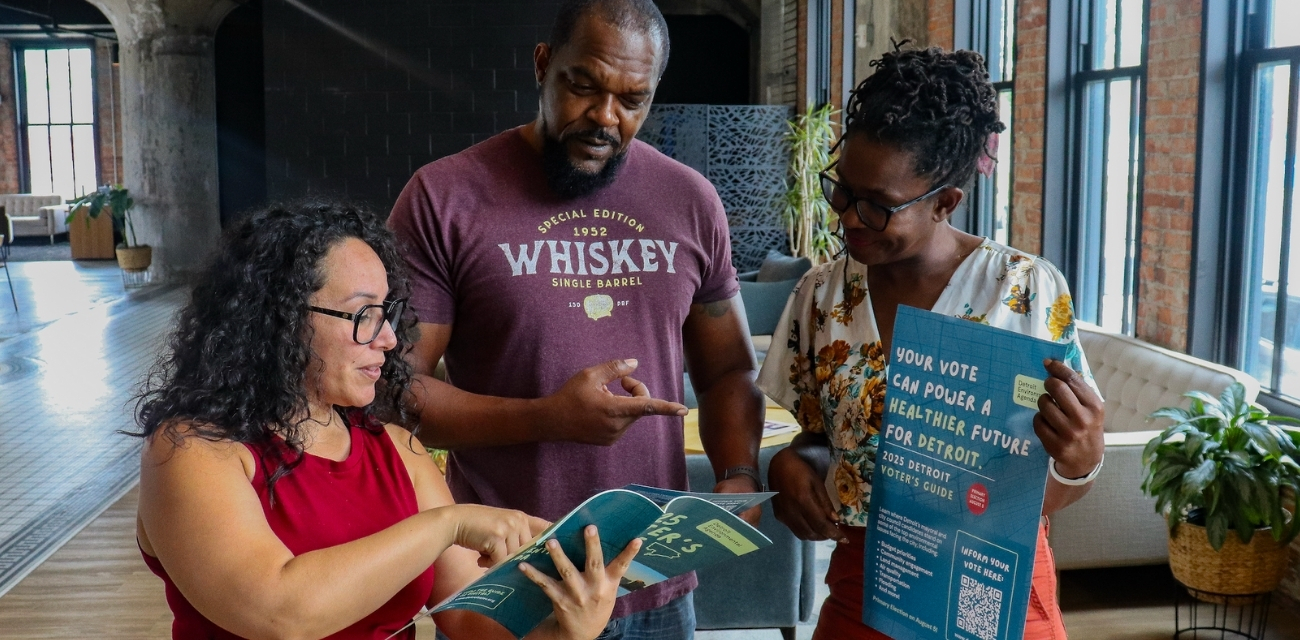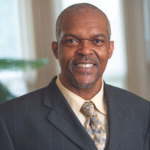How Detroiters are helping their city choose a healthier future

Authored by

Cody Gallagher
Connect With the Experts

Galen Hardy

Ellen Vial
Detroit is at a crossroads. As flooding grows more frequent, air quality is in decline and neighborhoods continue to bear the brunt of environmental neglect, the question isn’t whether change is needed—but who is willing to lead it. This year’s local elections offer a chance to choose leaders who see these challenges not as background noise, but as central to the city’s future.
That’s why the Detroit Environmental Agenda’s new voter’s guide matters. But the guide isn’t the story. The story is the community behind it and what they’re demanding.
“This guide is rooted in the everyday battles our communities face,” said Galen Hardy, Detroit program director at the Michigan Environmental Council, a Detroit Environmental Agenda member. “Air quality, water affordability, transportation—these are the things we fight for every day. These are the reasons we come to work. We want candidates who reflect those values.”
Detroit has lived with environmental injustice for decades. But lately, the crises have sharpened. Flooding has upended homes and lives. Air quality warnings from Canadian wildfire smoke and traffic pollution have become a summer norm. Childhood asthma rates remain among the worst in the country. These aren’t isolated issues. They’re symptoms of a system that has often treated health, housing and environment as afterthoughts.
That disconnect is what drives the Detroit Environmental Agenda coalition: a network of 20+ organizations, including the Environmental Council. Our coalition knows real solutions won’t come from campaign slogans. They have to come from people who understand that environmental justice is public safety, it’s economic equity, it’s survival.
“Ultimately, climate resilience planning happens at City Hall,” said Ellen Vial, the Environmental Council’s Detroit Program Manager. “We set some policy at the state and federal level, but the decisions that shape day-to-day life—how we manage land, how we handle flooding, how we engage with neighborhoods—those all happen locally. That’s why these elections are vital.”
The 2025 guide is just one piece of the coalition’s work. Vial has helped organize it for two election cycles and says this year’s version goes deeper than ever, thanks to the hard work of coalition members and a broader community lens.
“We rethought how we wrote the questions to make the guide more holistic,” she said. “This wasn’t just about what environmentalists want to know. It was about what all Detroiters deserve to know.”
One thing that surprised both Vial and Hardy: how many candidates voiced support for the priorities laid out by community advocates. “I was encouraged,” Vial said. “But the real question is, what happens next? Will they follow through once they’re in office?”
That’s where Hardy sees the guide’s power.
“It’s a tool residents can carry with them,” he said. “Not just to the polls but into the next four years. If someone said they’d prioritize asthma or clean water and they don’t, we can point back and ask, ‘Why not?’”
It also serves as a useful reference for the community for future elections.
“This guide keeps a record,” Hardy explained, “so if a candidate runs again in four years, voters can look back at what they said and see how their actions align.”
In other words, it’s not just about voting. It’s about accountability. Detroiters want to see meaningful progress on investment, protection and dignity. They’re looking for leadership that not only understands their priorities, but follows through on the commitments that matter most to their communities.
As Deborah Stewart Anderson of Zero Waste Detroit put it: “Our neighborhoods are tired of pollution and empty promises. We’re asking every candidate: what will you do to build a green, zero-waste future for our city—starting now?”
The guide is out there. The words are on record. And the work to shape Detroit’s future continues—election day and every day after.




